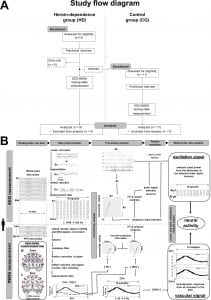Prof. Zhen Yuan, Ph.D., a professor in the Centre for Cognitive and Brain Sciences (CCBS) of University of Macau, Hada Fong-ha Ieong, Ph.D. student in the Yuan’s Lab (now a postdoc fellow in Yale University), and an interdisciplinary research team have developed a new machine learning method to measure where and when the brain activation and networks are altered for addictive patients as compared to healthy controls. Prof. Yuan and his colleagues have published a new paper on their findings in Scientific Reports, (2019) 9:18262 | https://doi.org/10.1038/s41598-019-54316-6.
Chronic and recurrent opiate use injuries the brain tissue and cause serious pathophysiological changes in hemodynamic and subsequent inflammatory responses. Prefrontal cortex (PFC) has been implicated in drug addiction. However, the mechanism underlying systems-level neuroadaptations in PFC during abstinence has not been fully characterized. The objective of this study was to determine what neural oscillatory activity contributes to the chronic effect of opiate exposure and whether the activity could be coupled to neurovascular information in the PFC. We employed resting-state functional connectivity to explore alterations in 8 patients with heroin dependency who stayed abstinent (>3months; HD) compared with 11 control subjects. A non-invasive neuroimaging strategy was applied to combine electrophysiological signals through electroencephalography (EEG) with hemodynamic signals through functional near-infrared spectroscopy (fNIRS). The electrophysiological signals indicate neural synchrony and the oscillatory activity, and the hemodynamic signals indicate blood oxygenation in small vessels in the PFC. A supervised machine learning method was used to obtain associations between EEG and fNIRS modalities to improve precision and localization. HD patients demonstrated desynchronized lower alpha rhythms and decreased connectivity in PFC networks. Asymmetric excitability and cerebrovascular injury were also observed. This pilot study suggests that cerebrovascular injury in PFC may result from chronic opiate intake.
In our efforts to continue to grow as one of the leading brain centers in the Guangdong-Hong Kong-Macao greater bay area, the CCBS has been recruiting talented early career faculty to make critical impacts in addiction and decision making. Prof. Yuan’s work is one example of how we are bringing new discoveries and innovations that continue to shape the future of CCBS.



